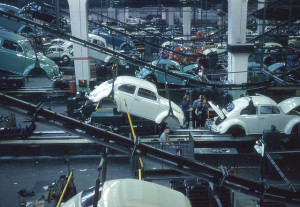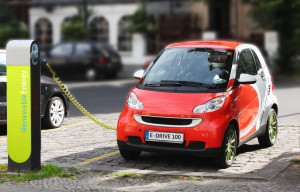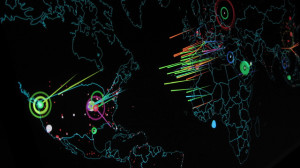By Peter Ward September 25, 2015
VW Chief Resigns over Emissions Scandal

Volkswagen assembly line ©Roger W
Volkswagen chief executive Martin Winterkorn resigned on Wednesday, after the company acknowledged it had cheated on emissions testing for 11 million of its cars.
The German automaker admitted this week that it had installed software in its cars that allowed them to pass emissions tests, even though they emit nitrogen oxide at up to 40 times the federal standard.
The scandal began in the United States, where VW is said to have used the software on 500,000 vehicles, but quickly spread to the rest of the company’s global car shipments. The company faces billions of dollars in fines and possible prosecution.
“I am shocked by the events of the past few days. Above all, I am stunned that misconduct on such a scale was possible in the Volkswagen Group,” Winterkorn said in a statement.
The New York Times enhanced its coverage of the affair with a graphic explaining exactly how Volkswagen managed to cheat on the emissions test. The software Volkswagen installed ensured that emissions were only reduced while the car was being tested – the rest of the time the equipment used to curb emissions was switched off, presumably to save fuel or improve acceleration.
The graphic shows exactly how this deception was pulled off, and also lists the seven car models affected. As of last year, VW sold around 10 million cars per year, about equal to car sales at Toyota and surpassing cars sold by GM, Hyundai and Ford.
VW’s stock price slid from $38.03 on Thursday last week to a low of $27.10 on Wednesday, recovering slightly following Winterkorn’s resignation.
Price Hike on AIDS Drug Dropped

Drugs ©Charles Kaiser
Turing Pharmaceuticals, the company that raised the price of a life-saving drug by more than 5,000%, announced on Tuesday it will lower the cost following public outrage.
The New York-based drug company, led by 32-year-old Martin Shkreli, a controversial former hedge fund manager, came under intense scrutiny after it was revealed that the compay bought the rights to the drug Daraprim and increased the price from $13.50 to $750 per pill.
Daraprim is used to treat a condition called toxoplasmosis, which is caused by a parasite that exists in nearly a quarter of the U.S. population aged 12 and over. The disease can be deadly to the unborn children of pregnant women and AIDS patients with compromised immune systems.
Shkreli initially attempted to defend the price hike, but finally gave in to public pressure and announced the price would be changed as a result of the anger directed towards the company.
Shkreli himself bore the brunt of much of that ill-feeling. The Washington post described him as “a new icon for modern greed”, while the BBC called him “the most hated man in America,” and The Daily Beast topped them all, running a story titled: “Martin Shkreli Is Big Pharma’s Biggest A**hole.”
Apple Electric Car Slated for 2019

“Electric Car Recharging” by Michael Movchinderivative work Licensed under CC BY-SA 3.0 via Wikimedia Commons.
Apple aims to build an electric car by 2019, The Wall Street Journal reported on Monday. The technology giant has been investigating the feasibility of selling an electric car for some time, but has now accelerated its efforts, according to the report.
Apple previously had a 600-person team on the project, code-named Titan, but has now tripled that number. There are driverless car experts among the team, although it is not believed the first car the company produces will be fully autonomous.
The electric car market has not enjoyed great sales in the U.S. The most popular car, the Tesla Model S, has only sold an estimated 15,100 units as of August this year – a minute sliver of the larger car industry. Tumbling fuel prices have also had a negative effect on the market.
But tightening emissions regulations, such as those broken by Volkswagen, have led automakers around the world to invest billions in building electric cars. By the time Apple’s car is released, the likes of Chevrolet, Porsche and Audi will already have electric cars on the market.
It remains unclear how Apple intends to manufacture the car, as most major automakers build and own manufacturing facilities. Apple has always used a manufacturing partner to build its phones and tablets.
Some say the 2019 target is overly ambitious. Although Apple says it intends to ship the device in that year, the company usually defines ship dates as when engineers sign off on the product, rather than when they are delivered to customers. (The Wall Street Journal goes to some lengths to explain this odd practice in the article.)
Caterpillar Cuts 10,000 jobs

Caterpillar motor scraper ©Anthony
Caterpillar, the largest mining and construction equipment manufacturer in the world, will cut up to 10,000 jobs over the next four years, the company announced on Thursday.
The Illinois-based firm expects sales to drop by 5% next year, and aims to trim annual operating costs by $1.5 billion.
“We are facing a convergence of challenging marketplace conditions in key regions and industry sectors – namely in mining and energy,” Caterpillar Chief Executive Officer Doug Oberhelman said in a statement. “While they are the right businesses to be in for the long term, we have to manage through what can be considerable and sometimes prolonged downturns.”
Caterpillar’s woes are a symptom of a number of global economic concerns. China, the world’s largest commodities consumer, has suffered an economic downturn, which has affected the prices of coal and metals. That slump has had a knock on effect on Caterpillar’s mining customers. The company also offers equipment to the energy sector, which has been hit by lower oil prices.
Caterpillar shares fell as much as 7.9% on Thursday.
Cyber Attacks Mapped

Cyber attacks ©Christiaan Colen
Chinese President Xi Jinping visited the U.S. this week, and cyber security was high on the agenda. The U.S. has repeatedly accused China of launching cyber attacks against American corporations and government infrastructure, in some cases to steal trade secrets.
Mother Jones used the visit to highlight a map created by cyber security company Kaspersky Lab, which shows the frequency of cyber attacks around the world. The 3D interactive allows users to see the origin, target and type of cyber attacks being launched in real time.
The graphic shows that China is not the only source of these types of attack, as hundreds are launched from different geographic locations around the globe every minute. Of course, the majority of these are not state sponsored, and most are likely small time criminals attempting to make money, but the map does show the scale of the cyber security problem.
The data collected by Kaspersky shows the U.S. is the second most frequently attacked country, behind Russia.
This entry was posted on Friday, September 25th, 2015 at 5:29 pm. It is filed under Week in Review. You can follow any responses to this entry through the RSS 2.0 feed.
Comments are closed.
